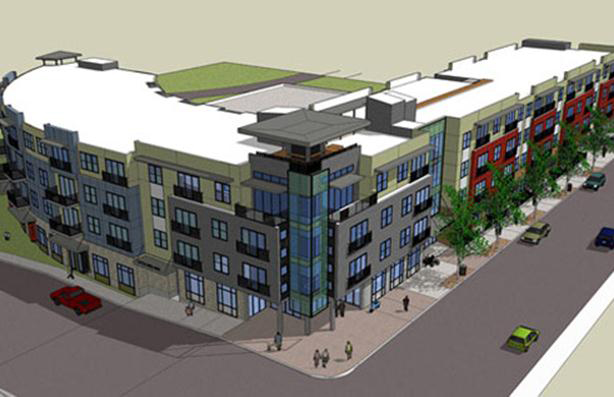WALNUT COMMONS* Cost: $11 million* Size: 100 apartments* Location: Walnut Street and Aquarium Way* Builder: Construction Enterprises Inc.* Parking: 120 spacesSource: Walnut Commons developers
About a dozen toddlers fitted with plastic hardhats and shovels symbolically broke ground Thursday on the largest new downtown Chattanooga apartment project in about three decades.
The children weren't even born when the building was originally proposed six years ago as developers hit hurdle after hurdle before finally reaching the start of construction.
"It has been very difficult, very complicated, but very worthwhile," Chattanooga developer John Clark said about the 100-unit, $11 million Walnut Commons apartments at Walnut Street and Aquarium Way.
When finished in about a year, the apartments will rent for between $750 and $1,200 a month, said Bob McKenzie, a partner in the project. The four-level complex will hold studio and one- and two-bedroom apartments, developers said.
Downtown workers are an ideal potential market for renters, they said.
"The market is certainly ready," Clark said.
Experts said that downtown apartments are tough projects to make work financially.
"Downtown development is more expensive in general," said Kim White, who heads the nonprofit central city redevelopment group River City Co. "It's more difficult than going out in the suburbs where you have a lot more land."
White said there are extra costs to assembling the land in addition to finding enough parking for residents.
"Apartments have a longer payback period," she added, noting that they're not sold to individual buyers such as condominiums.
Jeff Jennings of NAI Charter Real Estate Corp., which is not involved in Walnut Commons, said that, while there's demand for apartments in and around downtown, it takes a sophisticated and experienced developer to pull it off.
"Financing, zoning, parking and land acquisition are all hurdles which are magnified in downtown development, specifically as it relates to apartments," he said.
Little Miss Mag
Walnut Commons also will include the Little Miss Mag Early Learning Center, some of whose children helped break ground Thursday.
Little Miss Mag will own its space, said Clark, with the existing center on Walnut Street torn down and that property incorporated into the project.
Frank McDonald, Little Miss Mag's board president, said the new center will double its capacity to 96 children.
"It has been a long time in the works," he said.
David Hudson, another partner in the development, termed the project's start "a tribute to a lot of people to move forward."
When complete, Walnut Commons will be the largest apartment complex to go up in the central city since the 360-unit Cameron Hill Apartments were built more than a generation ago. Those apartments were torn down last decade to make room for BlueCross BlueShield of Tennessee's new home office.
At the time, Chattanooga developer and former Chattanooga Mayor Jon Kinsey planned to put up an apartment project downtown, but that was later abandoned. Kinsey said financing and timing for building apartments in the central business district were too difficult.
At about the same time, developer Trey Stanley planned to put up apartments on the 700 block of Market Street, but that project never got out off the ground.
The idea behind Walnut Commons has changed since it was proposed in mid-2006. Developers originally eyed condominiums at the site, which is owned by the Chattanooga Downtown Redevelopment Corp., a city entity.
But negotiations with the city took longer than expected. Developers wanted the city to give them the land to help the project work financially, but the city balked at the idea.
As condo construction downtown mushroomed, the developers struck a deal in late 2007 to build apartments. The city panel gave the group a 35-year lease with the option to purchase the vacant 1.5-acre site. The city will receive a portion of the rental income under the deal.
The nation's recession also slowed the project. Clark said the development group finally secured a loan package from the U.S. Department of Housing and Urban Development and Wells Fargo Multi-Family Capital, a subsidiary of Wells Fargo.
Wells Fargo made the loan and HUD is insuring it, he said.

